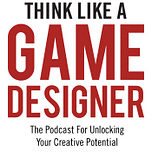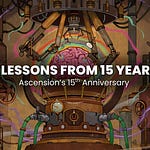Get the latest articles delivered to your inbox and contribute to our community by opting for a free or paid subscription. Paying subscribers enjoy an abundance of extra game design content and an additional exclusive newsletter with new lessons, archive access, videos, and more!
About C. Thi Nguyen
C. Thi Nguyen is an Associate Professor of Philosophy at the University of Utah and the author of the incredible book "Games: Agency as Art." In this episode, Thi delves into his theory of games as an art form that revolves around agency. His website, Objectionable.net, showcases an extensive collection of published papers on games, the philosophy of technology, and other intriguing topics. My conversation with Thi digs into the essence of games—exploring their power, addictiveness, and how game concepts can be applied to enhance your daily life. Don't miss this episode for a thought-provoking journey into the philosophy of games with Thi Nguyen.
Ah-ha! Justin’s Takeaways
The nature of games as aesthetic experiences: In this more philosophical episode, we discuss the nature of games and how they can be understood as more than just entertainment but as experiences with deep philosophical and aesthetic implications. I believe this is important for game designers to think about when designing games as times change and new technologies emerge.
The application of technology to creative processes: In the same vein as above, we discuss how philosophical concepts surrounding technology can influence creative endeavors, including game design, and how these ideas can be applied in practical ways.
The potential impact of societal metrics and gamification on personal and creative life: One discussion topic that I found particularly interesting was how societal metrics and gamification can both enhance and detract from daily life and creative work.
Show Notes
Fish Taco Adventures (00:00:00 - 00:10:00)
“I would get these obsessive quests about food, but they would change the entire shape of my life.”
We start by discussing Thi’s journey into becoming a philosopher focused on games and then dig into how he follows his curiosity into obsessive quests within his life. One of his adventures, seeking out the best fish tacos in east Los Angeles, eventually led him to pen food reviews for the LA Times. A profound takeaway from this chapter is Thi's pursuit of his passions, regardless of how far they diverge from conventional paths. I’ve come to believe that qualities of curiosity and obsession stand as common traits among many of the distinguished game designers (and creative minds) that I have encountered in my life thus far.
What makes a game designer an artist? (00:10:00 - 00:20:00)
“Playing a game is voluntarily taking on unnecessary obstacles to create the possibility of striving to overcome them.”
In this segment, we start digging into Thi’s philosophy of games, starting with a book called The Grasshopper. The idea is that obstacles are central to the value of the game. In other words, the constraints and the goals specified by the game create a new kind of action that has never existed before. “Dribbling, for example, doesn’t exist outside of basketball.” He goes on to describe a game designer as a sculptor of the environment, goals, and constraints, which together produce actions. There’s a lot to unpack in this section, so have your notebooks ready!
Discussing where we derive value from art (00:20:00 - 00:34:00
“I think just actually taking the time to enjoy myself and taking the time to slow down actually helps to keep things more balanced.”
Where does the value of art come from? We discuss whether a game’s value to a person is the artist’s experience, the audience’s experience, or the artist or audience you learn from it—there are a lot of theories discussed. My personal view is that we play games to learn and develop skills, enjoying both the experience of the game and the lessons learned from having played the game. We also discuss players who play to win or play because they enjoy the struggle.
In this part of the podcast, we explore a question: What is the source of art's value? Our discussion revolves around whether the value of a game lies in the experience of the designer crafting the game, the audience playing the game, or the knowledge gained by either party—there are a lot of theories!
From my perspective, the value of playing games is rooted in learning and skill development, where the joy comes not only from the gameplay itself but also from the insights and lessons gleaned post-game. Here, we also delve into the motivations of different types of players, some who play primarily to win and others who find pleasure in the challenge itself.
The Golden Age of Indy Tabletop (00:34:00 - 00:53:00)
“The amount of glorious density that came from adding a bit of tower defense positional play into a deckbuilder was enough to obsess me for six months of every moment of my free time.”
This says that for months, he’s been obsessed with the game Monster Train, which he describes as a mixture of tower defense and deckbuilding. As I’ve mentioned before, creativity is really just putting things together in a new way and executing that creation well. We then segue into a conversation about the current golden era of gaming, exploring the reasons behind this surge in the popularity and diversity of games. We then go on to talk about transformations in society resulting from shifts in communication methods, as well as the role and impact of metrics in the operations of large-scale companies.
Applying Game Experiences to Life (00:53:00 - 1:31:13)
“People are worried about games making serial killers; I’m worried about games making Wall Street bankers. The thing I’m most worried about is people taking out of games the expectations for some clear rigid value system.”
Big news—I’ve been working on a new book that ties game design to daily life. During this conversation, I seize the opportunity to explore Thi's perspective on the intersection of gaming and real-world experiences. We discuss, argue, and explore so much of what we’re both passionate about. This conversation was incredibly fun and covered a broad range of topics.
Learn more about Thi at objectionable.net
Read his book Games: Agency as Art
Find him on Twitter













